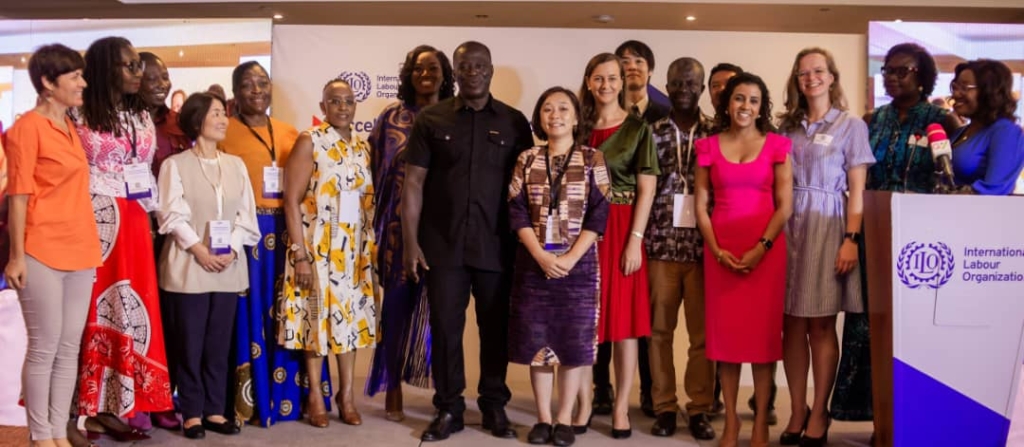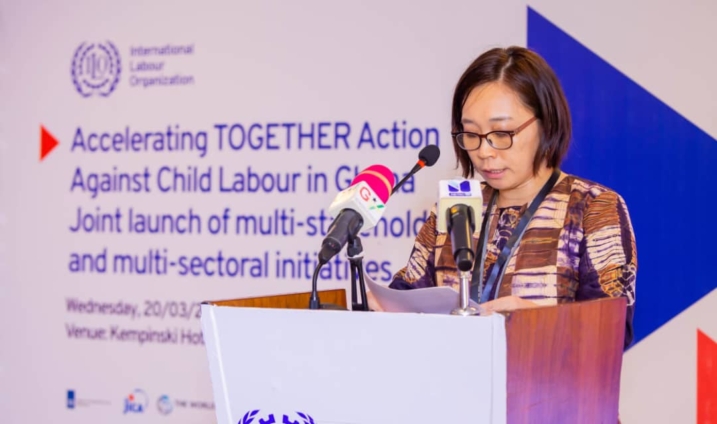
Audio By Carbonatix
The Ministry of Employment and Labour Relations (MELR) and its partners, including the United Nations Children’s Fund (UNICEF), International Cocoa Initiative (ICI), the Japan International Cooperation Agency (JICA) and International Labour Organization (ILO) organized a launch event titled: “Accelerating together action against child labour in Ghana, multi-stakeholder and multi-sectoral initiatives” in Accra.
The launch brought policy makers, Government officials across sectors at the national and sub-national levels, development partners, civil society organizations (CSOs), and the private sector to witness the launch of three new initiatives.
These initiatives aim to address the root causes of child labour, coordinate ongoing efforts and contribute to the Sustainable Development Goal (SDG) 8.7, which aims to “end child labour in all its form.”
The launch was chaired by Ignatius Baffour Awuah, Minister for Employment and Labour Relations (MELR).
More than 200 individuals attended the event, including Ms. Vanessa Phala, Country Director of ILO Country Office for Nigeria, Ghana, Liberia, Sierra Leone and Liaison Office for ECOWAS; Ms. Anne Kariuki, Representative officer in charge of UNICEF; Mr. Mike Arthur, Country Director of ICI; Dr. Ashwini Sebastian, Senior Agriculture Specialist from the World Bank; Ms. Momoko Suzuki, Chief Director of JICA; Naomi Tuinstra, representative of His Excellency Jeroen Verheul, Dutch Ambassador to Ghana; and Dr. Simone Haeberli, Deputy Head of Mission and Head of Cooperation of the Embassy of Switzerland in Ghana.
During the event, the following projects were launched:
Child labour Multisectoral and Multistakeholder Public-Private Partnership (PPP), supported by the Swiss State Secretariat for Economic Affairs (SECO), the Swiss Platform for Sustainable Cocoa (SWISSCO), UNICEF and ICI (Implemented in Bibiani-Anwiaso-Bekwai, Asunafo North, Ayensuano and Assin South districts from 2024 to 2025, total US$ 4 mil.

• Project for Mainstreaming Child Protection through Child Labour Free Zones (CLFZ), supported by JICA
• Accelerating Action for the Elimination of Child Labour in Supply Chains in Africa (ACCEL) Project, being financially supported by the Ministry of Foreign Affairs of the Netherlands and implemented by the ILO (Implemented in the Wassa Amenfi East, Bia East and Juaboso Districts of the Western and Western North Regions).
In his keynote address, Ignatius Baffour Awuah, Minister for Employment and Labour Relations (MELR), appealed to all partners within the project implementation areas to join this collaboration and leverage on the respective resources and expertise to expand coverage of the interventions towards eliminating child labour.
Also, statements from the various stakeholders emphasized on the need to commit to ending child labour, draw synergies among projects, prevent duplication and maximize resource utilization to achieve optimal impact.
Following the statements, a composite presentation on the various projects was delivered by ILO on behalf of the Partners. The presentation covered the objectives, operational areas and expected outcome of each project.
This joint event symbolizes a notable commitment from various partners, including the private sector, demonstrating their strong willingness to synergize and collaborate in support of the Government of Ghana in implementing the Ghana Accelerated Action Plan Against Child labour 2023 – 2027 (GAAPACL) and presenting a united front against child labour.
The Japan International Cooperation Agency, an incorporated administrative agency in charge of administering Japan’s Official Development Assistance (ODA) is one of the world’s largest bilateral aid agencies supporting socioeconomic development in developing countries in different regions of the world.
Since, 1974, JICA has supported the resolutions of issues in developing countries through a flexible combination of various types of assistance methods such as Technical Cooperations, Grants, Finance and Investment Cooperation, Emergency Disaster Relief, Public- Private Partnerships and Citizen participations.
Latest Stories
-
Adom FM’s ‘Strictly Highlife’ lights up La Palm with rhythm and nostalgia in unforgettable experience
2 hours -
Ghana is rising again – Mahama declares
6 hours -
Firefighters subdue blaze at Accra’s Tudu, officials warn of busy fire season ahead
6 hours -
Luv FM’s Family Party In The Park ends in grand style at Rattray park
6 hours -
Mahama targets digital schools, universal healthcare, and food self-sufficiency in 2026
6 hours -
Ghana’s global image boosted by our world-acclaimed reset agenda – Mahama
7 hours -
Full text: Mahama’s New Year message to the nation
7 hours -
The foundation is laid; now we accelerate and expand in 2026 – Mahama
7 hours -
There is no NPP, CPP nor NDC Ghana, only one Ghana – Mahama
7 hours -
Eduwatch praises education financing gains but warns delays, teacher gaps could derail reforms
7 hours -
Kusaal Wikimedians take local language online in 14-day digital campaign
8 hours -
Stop interfering in each other’s roles – Bole-Bamboi MP appeals to traditional rulers for peace
8 hours -
Playback: President Mahama addresses the nation in New Year message
9 hours -
Industrial and Commercial Workers’ Union call for strong work ethics, economic participation in 2026 new year message
11 hours -
Crossover Joy: Churches in Ghana welcome 2026 with fire and faith
11 hours

